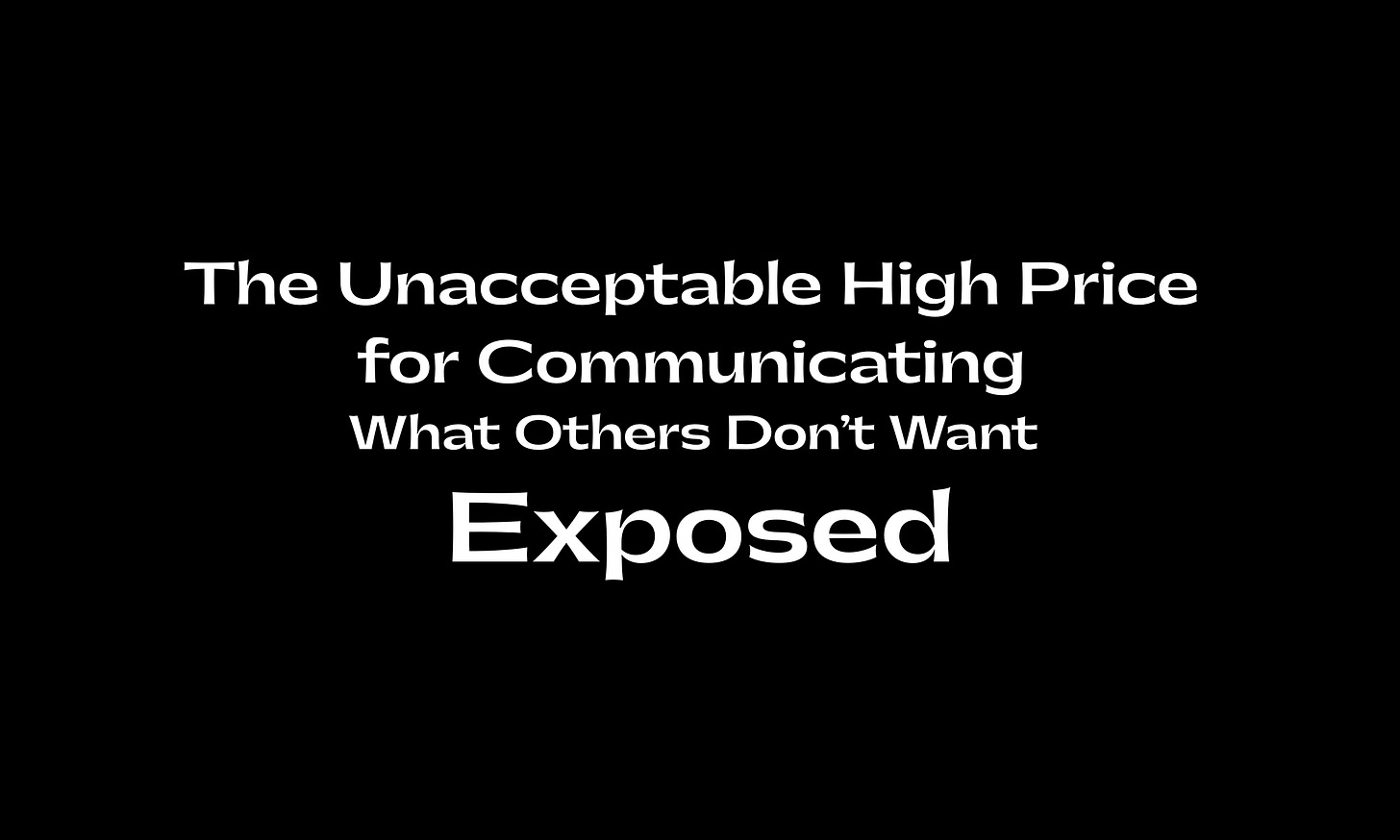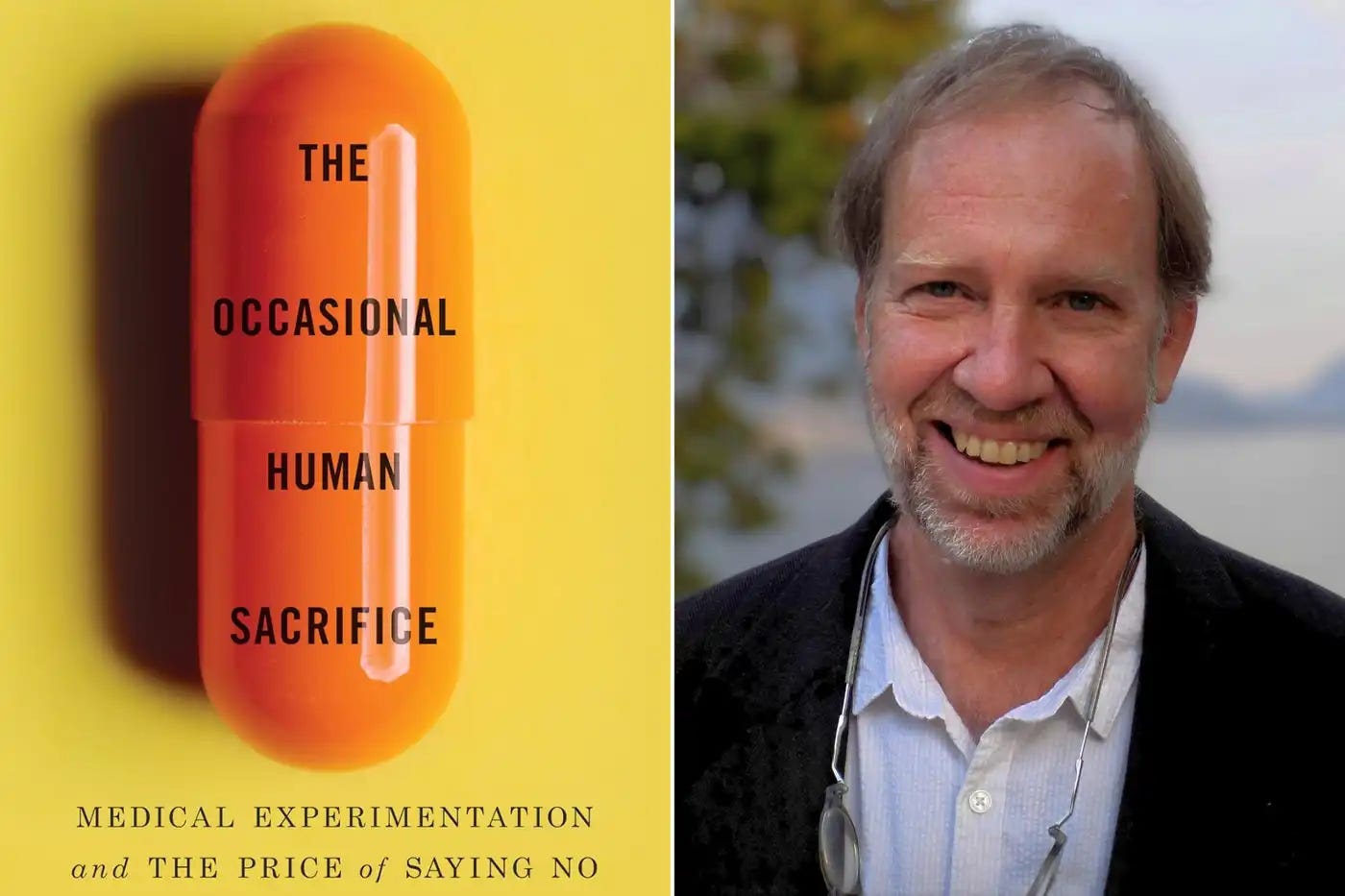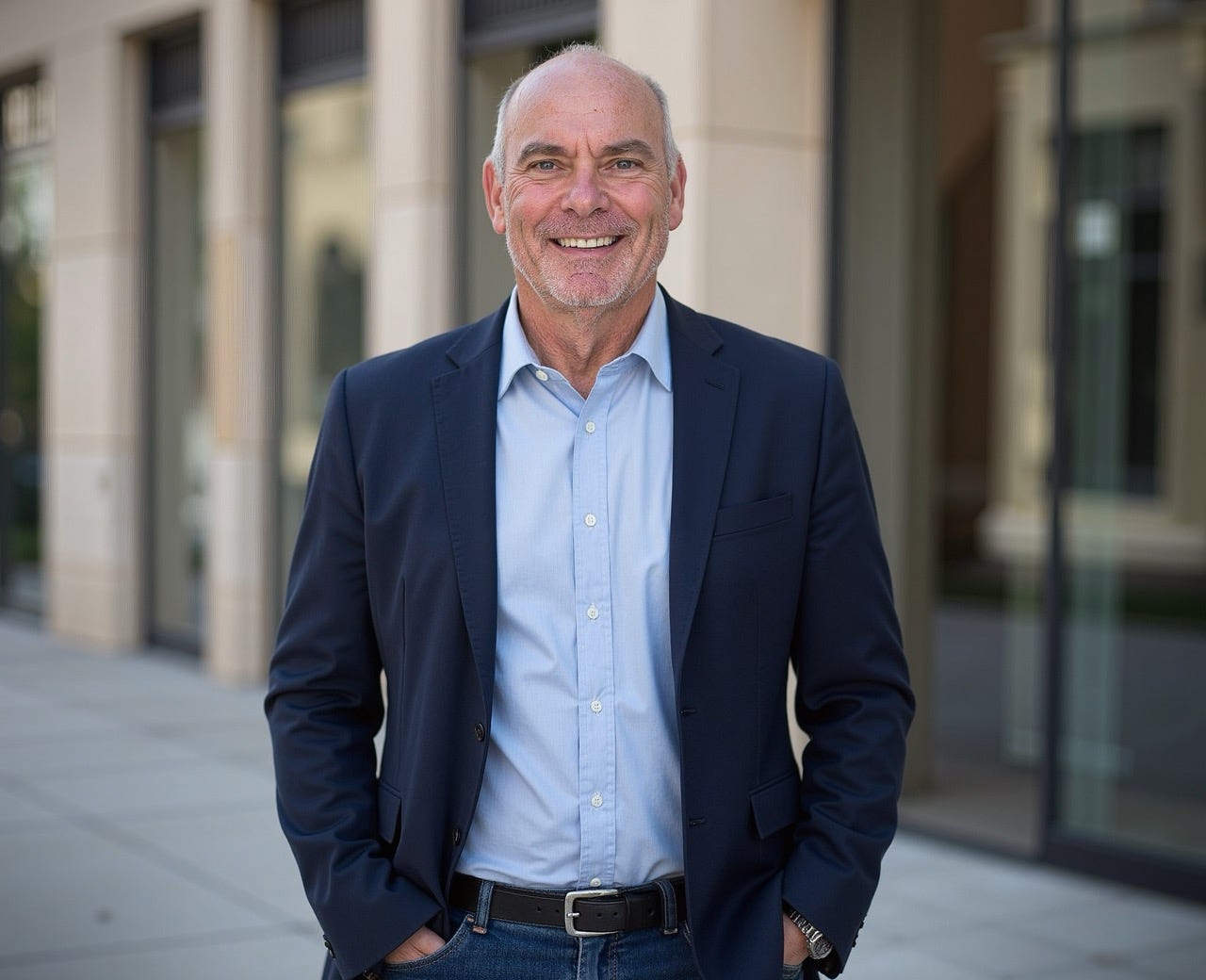'The Toll of Truth': What Happens
The costs, risks and what can be done to improve the reality and protect those who come forward
There can be a high cost for doing the right thing.
This special report was inspired by an article — The toll of truth: What happens when you expose medical wrongdoing — written by Mary Elizabeth Williams for Salon.
This piece will not be focused on healthcare because the topic is bigger than one industry. It will begin however by sharing parts of that article to set up a conversation.
There is a "toll of telling the truth," author Carl Elliott said, because, as doctor and fellow truth-teller John Pesando has pointed out, “Every whistleblower is an amateur playing against professionals.”
“That’s exactly what it's like, because on the other side, there is a script,” Elliott told Williams. “There is a script for the PR people and the crisis managers and the attorneys in the organization. They know how to deal with whistleblowers. They've been through it many times.
“But every whistleblower is doing it for the very first time and they're just stumbling around in the dark. And then they find themselves lost and isolated and ostracized. There's often a lot of effort to discredit whistleblowers.”
Those who bring forth problems have confidence or at least, hope, that good will come from it.
“It takes a certain amount of idealism to do this,” Elliott told Williams. “None of the people I talked to struck me as idealistic in any way but I'm talking to them after the fact. But they often tell a story of this sort of innocence — ‘I was so naïve back then, I thought that this would happen.’
“One of the things that you need to think will happen is, if everybody else sees what I've seen, if they know what I know, they're going to feel the same way. They're going to feel outraged, angry and demand justice. And it almost never happens that way.”
What quickly gets learned, Elliott asserted, is sobering.
“The authorities don't leap into action. Their colleagues are not grateful. Their friends very often don't want to be seen around them because they're so toxic and radioactive at work,” he explained.
“So it is very lonely. It's even lonely in the sense that I think a lot of people who do this struggle, tell themselves a meaningful story about it. Unless there are other people who've been through the same thing that you can talk it through with, you don't really know how to develop that story.”
It’s a perplexing, stressful time.
“If it's just a series of events that are senseless, then it's just very difficult to recover from that,” Elliott told Williams.
“The struggle, in the absence of any real success, is trying to tell yourself a story in which this all has some sort of meaning, and which you can, if not feel good about it, at least make your peace with it. That is not the typical David and Goliath story.”
When well-intentioned communication of clear wrongdoing is decided as necessary, people have to prepare themselves emotionally and psychologically, as well as protect their lives for what is coming, which is likely to be unfulfilling, problematic and severe.
“Whistleblowers don't just need courage, they need evidence: clear, objective, time-stamped evidence that can’t be minimized, distorted or erased,” says Anne Glaberson, the founder of Pathos X, which helps workers who feel trapped — and the creator of DecodifyAI, the first AI-powered proof engine for invisible workplace harm.
“Most harmful behavior in the workplace doesn’t show up in a single, dramatic moment. It accumulates slowly, in patterns of gaslighting, exclusion, manipulation, retaliation and power abuse,” Glaberson adds.
“By the time someone is ready to blow the whistle, they’re often exhausted, isolated and unsure how to prove what’s been happening. And the system they’re reporting into? It's geared to question their credibility, minimize the harm and protect the institution.”
The harmful impact doesn’t end there.
“When you speak truth to power, here’s what you can expect,” says Chaz Stevens, who leads REVOLT.training to help whistleblowers and activists effectively navigate battles and who has been shot at, stalked, sued, defamed, lost business and had his dog poisoned.
“Isolation. Rejection. (Negative) online comments. A David vs. Goliath reality: the system will sanitize your words and actions and will aggressively resist the truth. Stress, fear and anxiety will be your constant companions.
“Whistleblowing isn’t for the faint hearted but it’s often a fight worth having.”
It’s helpful to look at the big picture to gain perspective.
“Recognize that telling the truth inside systems built to suppress it is an act of radical courage and it often won’t feel like victory,” says Patrice Williams Lindo, who has worked in leadership roles at Deloitte, KPMG and Accenture and is now the CEO at Career Nomad.
“People need to build their support scaffolding before they blow the whistle: therapy, legal counsel, safe community, financial cushion and most importantly, clarity.
“Not just clarity on what they’re exposing but on who they are, what they stand for and what they will not compromise.”
She talks about the risks that are part of the territory.
“Truth-telling can strip people of titles, income and status but if you ground your identity in your values, you can survive the fire without burning out,” says Williams Lindo. “Assume the system will fight dirty.
“That doesn’t mean you stop. It means you train like a fighter.”
Mentally preparing for outcomes falling way short of your expectations or missing the mark altogether is valuable strategy and implementation for the hard road ahead and the mission.
“The wheels of justice turn slowly, painfully so,” Stevens says. “Prepare for a marathon, not a sprint. Praise is often few, far between and short-lived.”
There are other known realities.
“Over the decades, I’ve learned the game is rigged in favor of those with power and money,” Stevens adds. “Expect setbacks more often than wins. Don’t take losses personally, a tough-yet-essential lesson for beginners.
“Remain flexible, review, learn and adapt; be prepared to change course.”
“Expectation management is everything,” Williams Lindo agrees, explaining that, “Whistleblowers often believe the truth will lead to justice but in many systems, the truth is treated like a virus.”
She additionally agrees with Stevens about getting ready for what is coming after bringing hard truths forward.
“Rather than prepare for a Hollywood ending, prepare for resistance,” Williams Lindo advises. “Detach from the outcome and attach to the principle. You did what was right.
“That is the outcome. If change comes later, let that be legacy, not your lifeline. Be ready for silence, spin or slander. Let your truth be clean, documented and repeated.”
It may help fuel one’s commitment by increasing the moral and legal support to counteract the resistance on multiple fronts.
“Build a great paper case, document everything, learn how to file ‘smart’ Freedom of Information Act (FOIA) requests to establish clear evidence, attracting credible allies, advocacy groups and legal experts,” Stevens recommends.
He is quick to add, however, that “my substantial experience has proven you’ll find few supporters, it’s near impossible to break through the media noise and few folks have experience pitching and managing the press.
“Unless you’re lucky enough to go viral, social media will only take you so far.”
The next level of progress requires something more.
“Maximize your odds by focusing on media outreach, strong evidence and powerful storytelling,” Stevens says. “Learn to pitch (attractive information, angles and stories). So important.”
In the macro, Williams Lindo advocates for a root-cause response to lessen the toll of communicating truth.
“We must build ecosystems of accountability outside of the institutions being challenged,” she says. “That means stronger legal protections, yes, but also cultural capital.
“Whistleblowers should not be isolated islands. They should be surrounded by communities, journalists, advocates and allies who understand the cost of the truth and are ready to support it.”
Leaders and their attorneys can adjust their mindsets, ethics and morals as well.
“Organizations also need to normalize internal dissent as a sign of health, not defiance,” Williams Lindo says. “That starts with leadership modeling transparency and investing in independent ethics channels.”
The “how” for reforming the system so that truth telling can accomplish what is critical and valuable, remains an evergreen topic.
Moving farther away from it being easier to hide, discredit, dismiss or legally settle, accompanied with confidentiality agreements and no admittances of wrongdoing, have proven to be over-sized tasks.
“We need systemic rewiring,” Williams Lindo says. “That includes abolishing forced NDAs in whistleblower settlements, third-party reporting structures that bypass internal conflicts of interest, leadership KPIs tied to ethical culture, not just profit margins and federal-level transparency incentives for proactive disclosure.”
She summarizes her thoughts.
“Organizations must stop romanticizing reputation over repair,” Williams Lindo says. “Truth-tellers aren’t threats. They’re early-warning systems.”
Stevens analysis on Non-Disclosure Agreements are not positive.
“NDAs are evil, as they stifle (reporting of) wrongdoing,” he says. “SLAPP suits have been weakened over the years. FOIA laws, once robust, are now, well, not so much
“Unfortunately, I don’t hold out much hope for improvements, as those in charge do not want to be held accountable.”
He hasn’t given up though and presents an idea.
“One essential reform would be a statewide oversight body with actual enforcement power to investigate whistleblower disclosures impartially,” Stevens offers. “Without serious commitment, meaningful change remains a pipe dream but it's a fight worth continuing.”
The broken thinking, Elliott has explained, whether in academic health centers, as he has written about or in any organization, “is that reflexive tendency to say:
“Nobody can know about this. We have to keep it quiet. If we have a victim coming forward, or we have a whistleblower coming forward, we have to discredit them, so that no one will actually believe what they're saying.
“‘If we can't discredit it, then we need to sweep it under the rug. We need to keep it as quiet as possible. We need to settle it and we need to settle it with a confidentiality agreement so that nobody knows about this. And then, if they do know about it, never apologize. Never compensate the victims. Never admit wrongdoing.’”
Collectively, society knows, and deeply feels, that has no place, anywhere.
“Not only is it ethically, morally wrong to do that, I think it's also counterproductive,” Elliott told Williams. “Because how are you supposed to trust the system, when every time something like this comes up, they lie about it?
“They dissemble and they stonewall the press, and they do (it) every time.”
Trusting Continues to Get Harder to Do
What needs to be done so that organizations, courts and systems can be trusted?
“The system can only be trusted when it shows it is capable of holding itself accountable without being coerced by public shame or legal action,” Williams Lindo says.
“That means independent oversight and not insiders policing insiders, real consequences for unethical leadership and not golden parachutes and transparent post-investigation communications, not vague legalese.”
Without that level of professionalism, ethics and morals, expect the following:
“Until then, skepticism isn’t cynicism,” Williams Lindo says. “It’s wisdom.
“Those pushing for reform shouldn’t be silenced. They should be protected, empowered and praised.”
Stevens recalls some of his past work that helped expose criminal wrongdoing in Florida, leading to punishments for public officials.
“Here’s what I learned: legislators should mandate severe penalties for officials who lie or conceal wrongdoing, preemptively find and fix organizational misconduct and praise whistleblowers, don’t marginalize them. That is likely never to happen but it’s a wonderful dream to keep in mind.”
This newsletter normally publishes Tuesday, Thursday and Sunday, with occasional articles on other days. To advertise, link to your business, sponsor an article or section of the newsletter or discuss your affiliate marketing program, contact CI.









